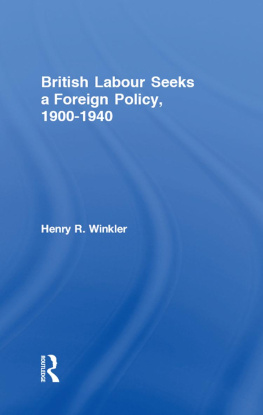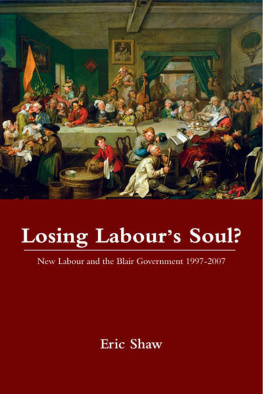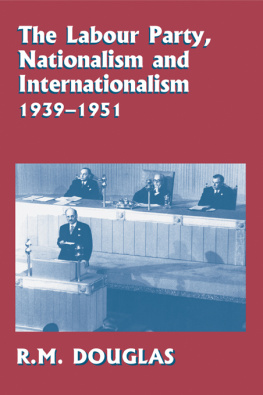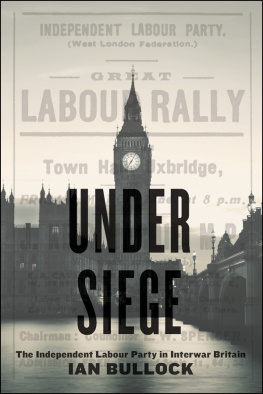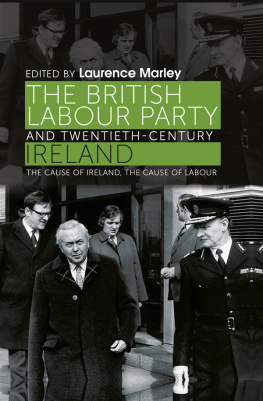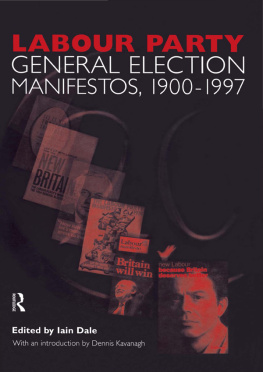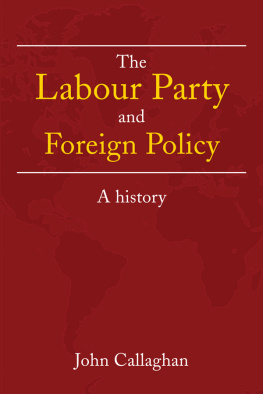British Labour Seeks a Foreign Policy,
1900-1940
British Labour Seeks a Foreign Policy,
1900-1940
Henry R. Winkler
First published 2005 by Transaction Publishers
Published 2017 by Routledge
2 Park Square, Milton Park, Abingdon, Oxon OX14 4RN
711 Third Avenue, New York, NY 10017, USA
Routledge is an imprint of the Taylor & Francis Group, an informa business
Copyright 2005 by Taylor & Francis.
All rights reserved. No part of this book may be reprinted or reproduced or utilised in any form or by any electronic, mechanical, or other means, now known or hereafter invented, including photocopying and recording, or in any information storage or retrieval system, without permission in writing from the publishers.
Notice:
Product or corporate names may be trademarks or registered trademarks, and are used only for identification and explanation without intent to infringe.
Library of Congress Catalog Number: 2004058858
Library of Congress Cataloging-in-Publication Data
Winkler, Henry R. (Henry Ralph), 1916-
British labour seeks a foreign policy, 1900-1940 / Henry R. Winkler.
p. cm.
Includes bibliographical references and index.
ISBN 0-7658-0264-3 (alk. paper)
1. Labour Party (Great Britain)PlatformsHistory. 2. Great BritainForeign relations1901-1936. 3. Great BritainForeign relations1936-1945. 4. Great BritainPolitics and government1901-1936. 5. Great BritainPolitics and government1936-1945. I. Title.
JN1129.L32W565 2004
327.41'009'041dc22
2004058858
ISBN 13: 978-0-7658-0264-4 (hbk)
Once again, for Bea
Contents
As always, I owe a large debt of gratitude to the librarians and archivists of the repositories noted in the bibliography of this essay. In particular, I have been helped generously by my friends and colleagues, Sally Moffitt, Associate Librarian of the Langsam Library of the University of Cincinnati and Stephen Bird, Archivist of the Labour Party Archives, now housed in Manchester. My son, Allan M. Winkler, Distinguished Professor of American History at Miami Univertsity of Ohio, and my daughter, Karen J. Moulton, long-time staff member of the Chronicle of Higher Education, have consistently been my severest and thus my most useful critics. They went over the manuscript word for word, not only helping my avoid the inevitable verbal infelicities that inevitably seem to creep into a work in progress, but more importantly to sharpen my argument and give it the clarity I hope to have achieved. My wife BeatriceBea to everyoneworked along with me every step of the way. It is her book as much as it is mine.
In the past half century, the British Labour Party has played a significant role in dealing with the complex issues of a troubled world. As one of the two major parties in the British system of government, Labour was central to the organization of the recovery of Europe after World War II. It shared leadership with the United States in shoring up the defenses of the Western world and in creating the North Atlantic Treaty Organization (NATO) to protect it during a difficult Cold War. Throughout this period, Labour governments acted responsibly and in accord with the views of a substantial majority of the British people. It was not always so.
The adoption of such a mainstream position marked just how far the Labour Party had moved from the attitudes and assumptions of the labour movement that gave it rise in the early twentieth century. Organized primarily to pursue a domestic political agenda, it focused first on industrial issueswages, hours of work, safety in the workplace, and conditions of work in general. For the most part, its founders had little interest in foreign policy. Yet, over the years, gradually and haltingly, Labour came to confront the world as it existed and eventually to take its place as one of the shaping forces in modern international life.
Various aspects of Labours approach to foreign policy have been well studied over the years. We have a series of exceptionally perceptive biographies, although there has, perhaps, been a tendency to emphasize dramatic figures like Ramsay MacDonald while not giving full consideration to other, less prominent, contributors to the foreign policy debate. We also have a number of investigations of particular parts of the story, ranging from studies of foreign policy positions during the First World War or in the 1920s and 1930s to evaluations of the first and second minority Labour governments. In addition, there are several useful accounts dealing with foreign policy issues. These, however, are either substantially theoretical in their thrust or offer little more than a compendium of Labour Party and Trades Union Congress resolutions, with little attention to the internal arguments that were at the heart of policy formation. There is still a need to explore how Labours foreign policy, so important in the world today, gradually emerged.
Labours foreign policy in these formative years has been given relatively little attention primarily because the party had almost no experience in office during the period. When it did form a government, in 1924 and in the period from 1929 to 1931, it was a minority government and was in office only long enough to make a modest contribution in international affairs. Day-to-day domestic concerns, dealing with bread-and-butter issues important to working people, were inevitably more important to party leadersand to subsequent scholars as well. During the Second World War and after, however, Labours leaders served first as key members of the coalition prosecuting the war and then as a government with a huge majority responsible for the conduct of British foreign policy in the immediate aftermath of the conflict. Not surprisingly, therefore, far more attention has been paid to the Labour Partys international policy in the postwar period, than to the formative years in which many of the principles of that policy were gradually fashioned.
The key to understanding the development of Labours approach to international affairs in the first half of the twentieth century is to observe that it was characterized by a struggle between principles and practice, an attempt to relate socialist theory to the changing realities of the international scene. The controversy over policy that took place within the party was complex, including, at different times and in different places, arguments against capitalism and imperialism, commitments to religious and secular pacifism, and efforts to promote broad-based rather than limited international organizationall within the context of changing relations with Europe, the United States, and then the Soviet Union.
Until the First World War, Labour demanded the rejection of militarism in the hands of capitalist and imperialist governments and argued that war itself could only be avoided by the cooperation of the working classes, that is, by socialist governments in much of the advanced world. Only a few working-class leaders gave much attention to foreign affairs beyond the reiteration of slogans and formulas that had little chance of being translated into reality.
Despite this rhetoric, the war itself came as a surprise to Labour. Far from acting as a unifying force, the conflict revealed the fissures that were to continue, in varying degrees, for years to come. Although pacifists and conscientious objectors, critics of prewar diplomacy, and advocates of a negotiated settlement with the enemy formed only a small minority within the labour movement when compared to those who supported the war more or less unquestioningly, the group of dissidents grew more substantial as the years of war dragged on. Despite the tensions, however, the war also fostered consideration of the kind of world Labour looked forward to at the end of the conflict. Although a number of important Liberals were prominent in developing plans for an international organization, the various Labour contributions to the idea of a League of Nations became by far the most far-reaching.

